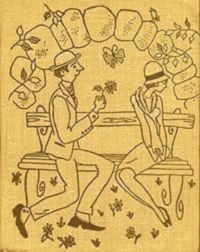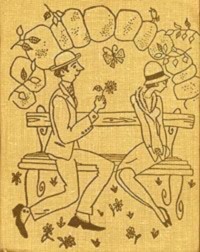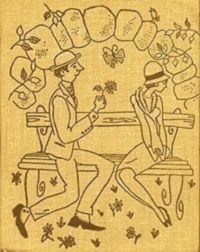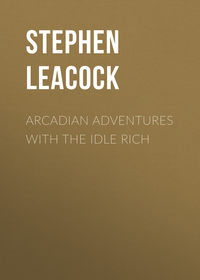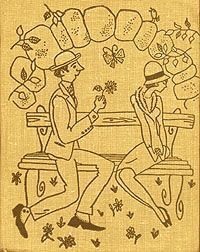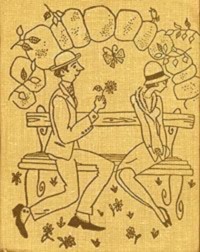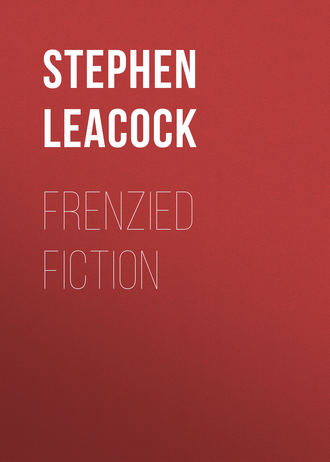 полная версия
полная версияFrenzied Fiction
I realized that he had one and the same line of talk that he always used. I resented it. No wonder it was easy for him. “Great mistake,” said Poppleton. “Too soft. Look at this”—here he picked up a big stone and began pounding at the gate-post—“see how easily it chips! Smashes right off. Look at that, the whole corner knocks right off, see!”
Beverly-Jones entered no protest. I began to see that there is a sort of understanding, a kind of freemasonry, among men who have summer places. One shows his things; the other runs them down, and smashes them. This makes the whole thing easy at once. Beverly-Jones showed his lawn.
“Your turf is all wrong, old boy,” said Poppleton. “Look! it has no body to it. See, I can kick holes in it with my heel. Look at that, and that! If I had on stronger boots I could kick this lawn all to pieces.”
“These geraniums along the border,” said Beverly-Jones, “are rather an experiment. They’re Dutch.”
“But my dear fellow,” said Poppleton, “you’ve got them set in wrongly. They ought to slope from the sun you know, never to it. Wait a bit”—here he picked up a spade that was lying where a gardener had been working—“I’ll throw a few out. Notice how easily they come up. Ah, that fellow broke! They’re apt to. There, I won’t bother to reset them, but tell your man to slope them over from the sun. That’s the idea.”
Beverly-Jones showed his new boat-house next and Poppleton knocked a hole in the side with a hammer to show that the lumber was too thin.
“If that were my boat-house,” he said, “I’d rip the outside clean off it and use shingle and stucco.”
It was, I noticed, Poppleton’s plan first to imagine Beverly-Jones’s things his own, and then to smash them, and then give them back smashed to Beverly-Jones. This seemed to please them both. Apparently it is a well-understood method of entertaining a guest and being entertained. Beverly-Jones and Poppleton, after an hour or so of it, were delighted with one another.
Yet somehow, when I tried it myself, it failed to work.
“Do you know what I would do with that cedar summer-house if it was mine?” I asked my host the next day.
“No,” he said.
“I’d knock the thing down and burn it,” I answered.
But I think I must have said it too fiercely. Beverly-Jones looked hurt and said nothing.
Not that these people are not doing all they can for me. I know that. I admit it. If I should meet my end here and if—to put the thing straight out—my lifeless body is found floating on the surface of this pond, I should like there to be documentary evidence of that much. They are trying their best. “This is Liberty Hall,” Mrs. Beverly-Jones said to me on the first day of my visit. “We want you to feel that you are to do absolutely as you like!”
Absolutely as I like! How little they know me. I should like to have answered: “Madam, I have now reached a time of life when human society at breakfast is impossible to me; when any conversation prior to eleven a.m. must be considered out of the question; when I prefer to eat my meals in quiet, or with such mild hilarity as can be got from a comic paper; when I can no longer wear nankeen pants and a coloured blazer without a sense of personal indignity; when I can no longer leap and play in the water like a young fish; when I do not yodel, cannot sing and, to my regret; dance even worse than I did when young; and when the mood of mirth and hilarity comes to me only as a rare visitant—shall we say at a burlesque performance—and never as a daily part of my existence. Madam, I am unfit to be a summer guest. If this is Liberty Hall indeed, let me, oh, let me go!”
Such is the speech that I would make if it were possible. As it is, I can only rehearse it to myself.
Indeed, the more I analyse it the more impossible it seems, for a man of my temperament at any rate, to be a summer guest. These people, and, I imagine, all other summer people, seem to be trying to live in a perpetual joke. Everything, all day, has to be taken in a mood of uproarious fun.
However, I can speak of it all now in quiet retrospect and without bitterness. It will soon be over now. Indeed, the reason why I have come down at this early hour to this quiet water is that things have reached a crisis. The situation has become extreme and I must end it.
It happened last night. Beverly-Jones took me aside while the others were dancing the fox-trot to the victrola on the piazza.
“We’re planning to have some rather good fun to-morrow night,” he said, “something that will be a good deal more in your line than a lot of it, I’m afraid, has been up here. In fact, my wife says that this will be the very thing for you.”
“Oh,” I said.
“We’re going to get all the people from the other houses over and the girls”—this term Beverly-Jones uses to mean his wife and her friends—“are going to get up a sort of entertainment with charades and things, all impromptu, more or less, of course—”
“Oh,” I said. I saw already what was coming.
“And they want you to act as a sort of master-of-ceremonies, to make up the gags and introduce the different stunts and all that. I was telling the girls about that afternoon at the club, when you were simply killing us all with those funny stories of yours, and they’re all wild over it.”
“Wild?” I repeated.
“Yes, quite wild over it. They say it will be the hit of the summer.”
Beverly-Jones shook hands with great warmth as we parted for the night. I knew that he was thinking that my character was about to be triumphantly vindicated, and that he was glad for my sake.
Last night I did not sleep. I remained awake all night thinking of the “entertainment.” In my whole life I have done nothing in public except once when I presented a walking-stick to the vice-president of our club on the occasion of his taking a trip to Europe. Even for that I used to rehearse to myself far into the night sentences that began: “This walking-stick, gentleman, means far more than a mere walking-stick.”
And now they expect me to come out as a merry master-of-ceremonies before an assembled crowd of summer guests.
But never mind. It is nearly over now. I have come down to this quiet water in the early morning to throw myself in. They will find me floating here among the lilies. Some few will understand. I can see it written, as it will be, in the newspapers.
“What makes the sad fatality doubly poignant is that the unhappy victim had just entered upon a holiday visit that was to have been prolonged throughout the whole month. Needless to say, he was regarded as the life and soul of the pleasant party of holiday makers that had gathered at the delightful country home of Mr. and Mrs. Beverly-Jones. Indeed, on the very day of the tragedy, he was to have taken a leading part in staging a merry performance of charades and parlour entertainments—a thing for which his genial talents and overflowing high spirits rendered him specially fit.”
When they read that, those who know me best will understand how and why I died. “He had still over three weeks to stay there,” they will say. “He was to act as the stage manager of charades.” They will shake their heads. They will understand.
But what is this? I raise my eyes from the paper and I see Beverly-Jones hurriedly approaching from the house. He is hastily dressed, with flannel trousers and a dressing-gown. His face looks grave. Something has happened. Thank God, something has happened. Some accident! Some tragedy! Something to prevent the charades!
I write these few lines on a fast train that is carrying me back to New York, a cool, comfortable train, with a deserted club-car where I can sit in a leather arm-chair, with my feet up on another, smoking, silent, and at peace.
Villages, farms and summer places are flying by. Let them fly. I, too, am flying—back to the rest and quiet of the city.
“Old man,” Beverly-Jones said, as he laid his hand on mine very kindly—he is a decent fellow, after all, is Jones—“they’re calling you by long-distance from New York.”
“What is it?” I asked, or tried to gasp.
“It’s bad news, old chap; fire in your office last evening. I’m afraid a lot of your private papers were burned. Robinson—that’s your senior clerk, isn’t it?—seems to have been on the spot trying to save things. He’s badly singed about the face and hands. I’m afraid you must go at once.”
“Yes, yes,” I said, “at once.”
“I know. I’ve told the man to get the trap ready right away. You’ve just time to catch the seven-ten. Come along.”
“Right,” I said. I kept my face as well as I could, trying to hide my exultation. The office burnt! Fine! Robinson’s singed! Glorious! I hurriedly packed my things and whispered to Beverly-Jones farewell messages for the sleeping household. I never felt so jolly and facetious in my life. I could feel that Beverly-Jones was admiring the spirit and pluck with which I took my misfortune. Later on he would tell them all about it.
The trap ready! Hurrah! Good-bye, old man! Hurrah! All right. I’ll telegraph. Right you are, good-bye. Hip, hip, hurrah! Here we are! Train right on time. Just these two bags, porter, and there’s a dollar for you. What merry, merry fellows these darky porters are, anyway!
And so here I am in the train, safe bound for home and the summer quiet of my club.
Well done for Robinson! I was afraid that it had missed fire, or that my message to him had gone wrong. It was on the second day of my visit that I sent word to him to invent an accident—something, anything—to call me back. I thought the message had failed. I had lost hope. But it is all right now, though he certainly pitched the note pretty high.
Of course I can’t let the Beverly-Joneses know that it was a put-up job. I must set fire to the office as soon as I get back. But it’s worth it. And I’ll have to singe Robinson about the face and hands. But it’s worth that too!
VI. To Nature and Back Again
It was probably owing to the fact that my place of lodgment in New York overlooked the waving trees of Central Park that I was consumed, all the summer through, with a great longing for the woods. To me, as a lover of Nature, the waving of a tree conveys thoughts which are never conveyed to me except by seeing a tree wave.
This longing grew upon me. I became restless with it. In the daytime I dreamed over my work. At night my sleep was broken and restless. At times I would even wander forth, at night into the park, and there, deep in the night shadow of the trees, imagine myself alone in the recesses of the dark woods remote from the toil and fret of our distracted civilization.
This increasing feeling culminated in the resolve which becomes the subject of this narrative. The thought came to me suddenly one night. I woke from my sleep with a plan fully matured in my mind. It was this:
I would, for one month, cast off all the travail and cares of civilized life and become again the wild man of the woods that Nature made me. M woods, somewhere in New England, divest myself of my clothes—except only my union suit—crawl into the woods, stay there a month and then crawl out again. To a trained woodsman and crawler like myself the thing was simplicity itself. For food I knew that I could rely on berries, roots, shoots, mosses, mushrooms, fungi, bungi—in fact the whole of Nature’s ample storehouse; for my drink, the running brook and the quiet pool; and for my companions the twittering chipmunk, the chickadee, the chocktaw, the choo-choo, the chow-chow, and the hundred and one inhabitants of the forgotten glade and the tangled thicket.
Fortunately for me, my resolve came to me upon the last day in August. The month of September was my vacation. My time was my own. I was free to go.
On my rising in the morning my preparations were soon made; or, rather, there were practically no preparations to make. I had but to supply myself with a camera, my one necessity in the woods, and to say good-bye to my friends. Even this last ordeal I wished to make as brief as possible. I had no wish to arouse their anxiety over the dangerous, perhaps foolhardy, project that I had in mind. I wished, as far as possible, to say good-bye in such a way as to allay the very natural fears which my undertaking would excite in the minds of my friends.
From myself, although trained in the craft of the woods, I could not conceal the danger that I incurred. Yet the danger was almost forgotten in the extraordinary and novel interest that attached to the experiment. Would it prove possible for a man, unaided by our civilized arts and industries, to maintain himself naked—except for his union suit—in the heart of the woods? Could he do it, or could he not? And if he couldn’t what then?
But this last thought I put from me. Time alone could answer the question.
As in duty bound, I went first to the place of business where I am employed, to shake hands and say good-bye to my employer.
“I am going,” I said, “to spend a month naked alone in the woods.”
He looked up from his desk with genial kindliness.
“That’s right,” he said, “get a good rest.”
“My plan is,” I added, “to live on berries and funguses.”
“Fine,” he answered. “Well, have a good time, old man—good-bye.”
Then I dropped in casually upon one of my friends.
“Well,” I said, “I’m off to New England to spend a month naked.”
“Nantucket,” he said, “or Newport?”
“No,” I answered, speaking as lightly as I could. “I’m going into the woods and stay there naked for a month.”
“Oh, yes,” he said. “I see. Well, good-bye, old chap—see you when you get back.”
After that I called upon two or three other men to say a brief word of farewell. I could not help feeling slightly nettled, I must confess, at the very casual way in which they seemed to take my announcement. “Oh, yes,” they said, “naked in the woods, eh? Well, ta-ta till you get back.”
Here was a man about to risk his life—for there was no denying the fact—in a great sociological experiment, yet they received the announcement with absolute unconcern. It offered one more assurance, had I needed it, of the degenerate state of the civilization upon which I was turning my back.
On my way to the train I happened to run into a newspaper reporter with whom I have some acquaintance.
“I’m just off,” I said, “to New England to spend a month naked—at least naked all but my union suit—in the woods; no doubt you’ll like a few details about it for your paper.”
“Thanks, old man,” he said, “we’ve pretty well given up running that nature stuff. We couldn’t do anything with it—unless, of course, anything happens to you. Then we’d be glad to give you some space.”
Several of my friends had at least the decency to see me off on the train. One, and one alone accompanied me on the long night-ride to New England in order that he might bring back my clothes, my watch, and other possessions from the point where I should enter the woods, together with such few messages of farewell as I might scribble at the last moment.
It was early morning when we arrived at the wayside station where we were to alight. From here we walked to the edge of the woods. Arrived at this point we halted. I took off my clothes, with the exception of my union suit. Then, taking a pot of brown stain from my valise, I proceeded to dye my face and hands and my union suit itself a deep butternut brown.
“What’s that for?” asked my friend.
“For protection,” I answered. “Don’t you know that all animals are protected by their peculiar markings that render them invisible? The caterpillar looks like the leaf it eats from; the scales of the fish counterfeit the glistening water of the brook; the bear and the ‘possum are coloured like the tree-trunks on which they climb. There!” I added, as I concluded my task. “I am now invisible.”
“Gee!” said my friend.
I handed him back the valise and the empty paint-pot, dropped to my hands and knees—my camera slung about my neck—and proceeded to crawl into the bush. My friend stood watching me.
“Why don’t you stand up and walk?” I heard him call.
I turned half round and growled at him. Then I plunged deeper into the bush, growling as I went.
After ten minutes’ active crawling I found myself in the heart of the forest. It reached all about me on every side for hundreds of miles. All around me was the unbroken stillness of the woods. Not a sound reached my ear save the twittering of a squirrel, or squirl, in the branches high above my head or the far-distant call of a loon hovering over some woodland lake.
I judged that I had reached a spot suitable for my habitation.
My first care was to make a fire. Difficult though it might appear to the degenerate dweller of the city to do this, to the trained woodsman, such as I had now become, it is nothing. I selected a dry stick, rubbed it vigorously against my hind leg, and in a few moments it broke into a generous blaze. Half an hour later I was sitting beside a glowing fire of twigs discussing with great gusto an appetizing mess of boiled grass and fungi cooked in a hollow stone.
I ate my fill, not pausing till I was full, careless, as the natural man ever is, of the morrow. Then, stretched out upon the pine-needles at the foot of a great tree, I lay in drowsy contentment listening to the song of the birds, the hum of the myriad insects and the strident note of the squirrel high above me. At times I would give utterance to the soft answering call, known to every woodsman, that is part of the freemasonry of animal speech. As I lay thus, I would not have exchanged places with the pale dweller in the city for all the wealth in the world. Here I lay remote from the world, happy, full of grass, listening to the crooning of the birds.
But the mood of inaction and reflection cannot last, even with the lover of Nature. It was time to be up and doing. Much lay before me to be done before the setting of the sun should bring with it, as I fully expected it would, darkness. Before night fell I must build a house, make myself a suit of clothes, lay in a store of nuts, and in short prepare myself for the oncoming of winter, which, in the bush, may come on at any time in the summer.
I rose briskly from the ground to my hands and knees and set myself to the building of my house. The method that I intended to follow here was merely that which Nature has long since taught to the beaver and which, moreover, is known and practised by the gauchos of the pampas, by the googoos of Rhodesia and by many other tribes. I had but to select a suitable growth of trees and gnaw them down with my teeth, taking care so to gnaw them that each should fall into the place appointed for it in the building. The sides, once erected in this fashion, another row of trees, properly situated, is gnawed down to fall crosswise as the roof.
I set myself briskly to work and in half an hour had already the satisfaction of seeing my habitation rising into shape. I was still gnawing with unabated energy when I was interrupted by a low growling in the underbrush. With animal caution I shrank behind a tree, growling in return. I could see something moving in the bushes, evidently an animal of large size. From its snarl I judged it to be a bear. I could hear it moving nearer to me. It was about to attack me. A savage joy thrilled through me at the thought, while my union suit bristled with rage from head to foot as I emitted growl after growl of defiance. I bared my teeth to the gums, snarling, and lashed my flank with my hind foot. Eagerly I watched for the onrush of the bear. In savage combat who strikes first wins. It was my idea, as soon as the bear should appear, to bite off its front legs one after the other. This initial advantage once gained, I had no doubt of ultimate victory.
The brushes parted. I caught a glimpse of a long brown body and a hairy head. Then the creature reared up, breasting itself against a log, full in front of me. Great heavens! It was not a bear at all. It was a man.
He was dressed, as I was, in a union suit, and his face and hands, like mine, were stained a butternut brown. His hair was long and matted and two weeks’ stubble of beard was on his face.
For a minute we both glared at one another, still growling. Then the man rose up to a standing position with a muttered exclamation of disgust.
“Ah, cut it out,” he said. “Let’s talk English.”
He walked over towards me and sat down upon a log in an attitude that seemed to convey the same disgust as the expression of his features. Then he looked round about him.
“What are you doing?” he said.
“Building a house,” I answered.
“I know,” he said with a nod. “What are you here for?”
“Why,” I explained, “my plan is this: I want to see whether a man can come out here in the woods, naked, with no aid but that of his own hands and his own ingenuity and—”
“Yes, yes, I know,” interrupted the disconsolate man. “Earn himself a livelihood in the wilderness, live as the cave-man lived, carefree and far from the curse of civilization!”
“That’s it. That was my idea,” I said, my enthusiasm rekindling as I spoke. “That’s what I’m doing; my food is to be the rude grass and the roots that Nature furnishes for her children, and for my drink—”
“Yes, yes,” he interrupted again with impatience, “for your drink the running rill, for your bed the sweet couch of hemlock, and for your canopy the open sky lit with the soft stars in the deep-purple vault of the dewy night. I know.”
“Great heavens, man!” I exclaimed. “That’s my idea exactly. In fact, those are my very phrases. How could you have guessed it?”
He made a gesture with his hand to indicate weariness and disillusionment.
“Pshaw!” he said. “I know it because I’ve been doing it. I’ve been here a fortnight now on this open-air, life-in-the-woods game. Well, I’m sick of it! This last lets me out.”
“What last?” I asked.
“Why, meeting you. Do you realize that you are the nineteenth man that I’ve met in the last three days running about naked in the woods? They’re all doing it. The woods are full of them.”
“You don’t say so!” I gasped.
“Fact. Wherever you go in the bush you find naked men all working out this same blasted old experiment. Why, when you get a little farther in you’ll see signs up: NAKED MEN NOT ALLOWED IN THIS BUSH, and NAKED MEN KEEP OFF, and GENTLEMEN WHO ARE NAKED WILL KINDLY KEEP TO THE HIGH ROAD, and a lot of things like that. You must have come in at a wrong place or you’d have noticed the little shanties that they have now at the edge of the New England bush with signs up: UNION SUITS BOUGHT AND SOLD, CAMERAS FOR SALE OR TO RENT, HIGHEST PRICE FOR CAST-OFF CLOTHING, and all that sort of thing.”
“No,” I said. “I saw nothing.”
“Well, you look when you go back. As for me, I’m done with it. The thing’s worked out. I’m going back to the city to see whether I can’t, right there in the heart of the city, earn myself a livelihood with my unaided hands and brains. That’s the real problem; no more bumming on the animals for me. This bush business is too easy. Well, good-bye; I’m off.”
“But stop a minute,” I said. “How is it that, if what you say is true, I haven’t seen or heard anybody in the bush, and I’ve been here since the middle of the morning?”
“Nonsense,” the man answered. “They were probably all round you but you didn’t recognize them.”
“No, no, it’s not possible. I lay here dreaming beneath a tree and there wasn’t a sound, except the twittering of a squirrel and, far away, the cry of a lake-loon, nothing else.”
“Exactly, the twittering of a squirrel! That was some feller up the tree twittering to beat the band to let on that he was a squirrel, and no doubt some other feller calling out like a loon over near the lake. I suppose you gave them the answering cry?”
“I did,” I said. “I gave that low guttural note which—”
“Precisely—which is the universal greeting in the freemasonry of animal speech. I see you’ve got it all down pat. Well, good-bye again. I’m off. Oh, don’t bother to growl, please. I’m sick of that line of stuff.”
“Good-bye,” I said.
He slid through the bushes and disappeared. I sat where I was, musing, my work interrupted, a mood of bitter disillusionment heavy upon me. So I sat, it may have been for hours.
In the far distance I could hear the faint cry of a bittern in some lonely marsh.
“Now, who the deuce is making that noise?” I muttered. “Some silly fool, I suppose, trying to think he’s a waterfowl. Cut it out!”



